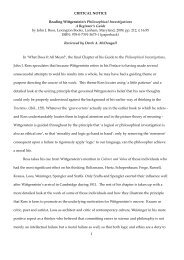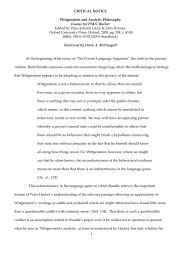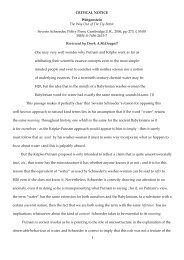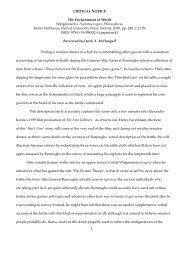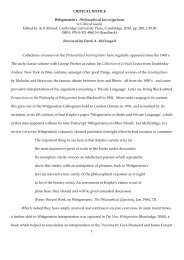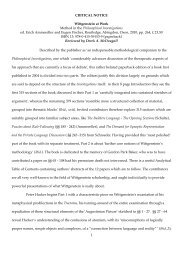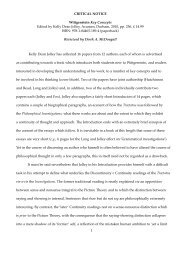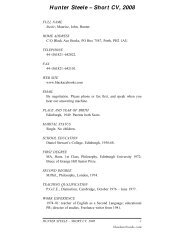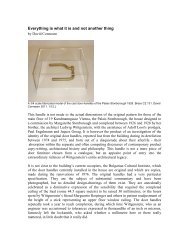The Evolution of the Private Language Argument Aldershot
The Evolution of the Private Language Argument Aldershot
The Evolution of the Private Language Argument Aldershot
You also want an ePaper? Increase the reach of your titles
YUMPU automatically turns print PDFs into web optimized ePapers that Google loves.
<strong>of</strong> sensations which we are prone to adopt when doing philosophy provides <strong>the</strong> proper picture<strong>of</strong> what is involved in calling <strong>the</strong>m by name. Yet even in <strong>the</strong> course <strong>of</strong> pointing out that whenwe refer to ‘<strong>the</strong> taste <strong>of</strong> onions’, this is a taste which is ‘certainly recognisable and identifiablein itself’, Strawson concedes that ‘one does not use criteria <strong>of</strong> identity for <strong>the</strong> taste’, suggestingthat if one asks what <strong>the</strong> criterion <strong>of</strong> identity is here, one can only answer ‘Well, <strong>the</strong> taste itself’.But this is effectively to concede to Wittgenstein <strong>the</strong> point he makes in § 381 when he statesthat ‘I have learnt English’ is an answer to <strong>the</strong> question how he knows that this colour is red.This, however, has to be balanced against o<strong>the</strong>r claims made by Strawson - notmentioned by Neilsen - which are totally at odds with Wittgenstein’s intentions, including hissupposition that <strong>the</strong> private language user would have no proper check on <strong>the</strong> correctness <strong>of</strong>his use <strong>of</strong> it, whe<strong>the</strong>r using memory or not, and that this equally applies to a ‘private language’used to talk about ‘colours or material objects or animals’. He <strong>the</strong>n appears to anticipate SaulKripke in his suggestion that in this case even <strong>the</strong> presence <strong>of</strong> a physical dictionary would notbe sufficient to provide an external check on <strong>the</strong> correctness <strong>of</strong> his use <strong>of</strong> names, because <strong>the</strong>interpretation <strong>of</strong> such a dictionary depends on <strong>the</strong> application that is made <strong>of</strong> it. Strawson endswith <strong>the</strong> suggestion that Wittgenstein’s arguments point towards <strong>the</strong> conclusion that <strong>the</strong> idea<strong>of</strong> a language ‘<strong>of</strong> any kind’ used by only one individual is an absurdity, when it is not made clearwhe<strong>the</strong>r this individual is intended to be isolated in practice or in principle from a surroundingcommunity <strong>of</strong> o<strong>the</strong>r individuals. <strong>The</strong>re remain apparent contradictions in Strawson’s presentationwhich are difficult to resolve.Chapter 6, ‘<strong>The</strong> Availability <strong>of</strong> an <strong>Argument</strong>’, has Nielsen providing a very goodaccount <strong>of</strong> Judith Jarvis Thomson’s famous paper ‘<strong>Private</strong> <strong>Language</strong>s’ from 1964, in whichshe claims that <strong>the</strong> way in which Malcolm presents his Reductio <strong>Argument</strong> would rule out evena public language, since <strong>the</strong> fact that a language is used ‘in isolation’ does not in itself exclude<strong>the</strong> possibility that a speaker can meaningfully talk about his sensations, a point echoed viaAyer’s original assumption that if we presume that from <strong>the</strong> beginning our sensations are16



